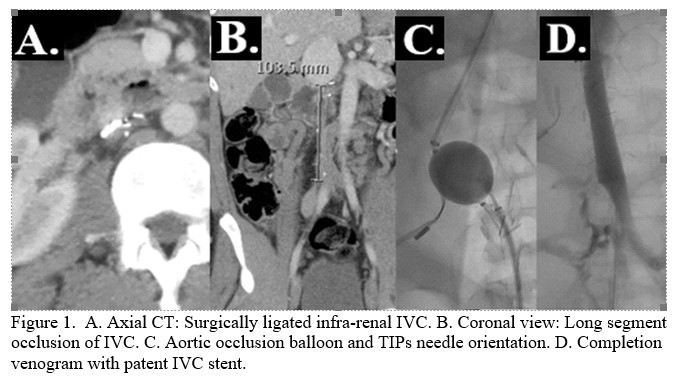Percutaneous Sharp Recanalization Of A Surgically Ligated Infra-renal Ivc
Justin M. Milligan, MD, Animesh Rathore, MD, David J. Dexter, MD, Jean M. Panneton, MD.
Eastern Virginia Medical School, Norfolk, VA, USA.
DEMOGRAPHICS: A 36-year-old male patient in excellent health with a quite active lifestyle. HISTORY: This patient has a history of gunshot wound to the abdomen requiring subsequent IVC ligation 20 years ago. Subsequently the patient has experienced chronic lower extremity swelling and chronic lower extremity venous stasis ulcers refractory to conservative non operative treatment despite excellent compliance.
PLAN: Given the patientís otherwise excellent health and active lifestyle, consideration for endovascular re-canalization of the IVC was made. The procedure was carried out under general anesthesia. From a right common femoral vein sheath, a crossing catheter and hydrophilic guide wire were advanced from a patent IVC bifurcation to the level of the ligated IVC via a retro-peritoneal track. A TIPS trocar was then advanced from the femoral sheath and an aortic occlusion balloon was advanced into the IVC stump just below the renal vein confluence from a right internal jugular access. The TIPS needle was then advanced perforating the occlusion balloon, thus obtaining true lumen access in the patent IVC. The retroperitoneal track was then serially dilated up to 18 mm. Venography and IVUS were used to confirm anatomy and a self-expanding bare metal stent was deployed from the patent IVC to just above the iliac bifurcation. Post procedure course was uncomplicated. Patient was discharged home on post-procedure day 2 on clopidogrel and rivaroxaban. On follow up at 2 weeks, the patient has resolution of lower extremity edema and associated symptoms and complete healing of his venous stasis ulcers which continue now 6 months post procedure. Duplex ultrasound of the IVC has revealed a widely patent stent. DISCUSSION: Inferior vena cava (IVC) ligation is an acceptable means of obtaining hemostasis as a damage control measure in hemodynamically unstable trauma patient. However, subsequent long-term sequelae of IVC ligation is poorly described. Open IVC reconstruction is associated with significant morbidity. Endovascular IVC re-canalization has been reported in the setting of IVC occlusion from various etiologies with promising results. This case report highlights a novel application of sharp re-canalization of a surgically ligated IVC. 
Back to 2020 Abstracts
